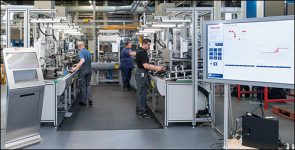
German manufacturer Bosch Rexroth uses RFID, Bluetooth technology to improve production efficiency
[ad_1]
Electronic drives and controls company Bosch Rexroth is using RFID technology on its Humboldt assembly line in Germany, increasing survivability and reducing the amount of inventory on site. By using this self-developed hybrid RFID and Bluetooth beacon solution, the company has also improved the production efficiency and reduced error rates of hundreds of hydraulic valves.
Launched in 2014, the solution identifies the employees and components in front of each specific station, while also sending the appropriate work instructions to the employees. The system also tracks the number of components being assembled to determine how many components need to be ordered. Currently, the company is also promoting the technology to other manufacturers.

Bosch Rexroth is a subsidiary of the Bosch Group, which mainly produces automated industrial products including hydraulic systems, electrical drives, control systems, gear technology, and assembly technology. The company’s Humboldt plant in Germany assembles more than 200 hydraulic valve products.
Before using this system, the 200 hydraulic valves were produced on 3 parallel production lines. Because production batches tend to be small, the company needs to switch lines to produce other products at short notice, which means the company needs to prepare 2,000 different components. In addition, during the production process, employees need to identify the types of products being produced based on the paper work instructions. This process is often time-consuming and has a certain probability of error.
The solution uses high-frequency RFID and Bluetooth technology to connect employees, products and machines on the assembly line. Bosch Rexroth calls it an Industry 4.0 solution that uses network technology to transform machines for smart manufacturing. The company uses its own RFID hardware and has developed IOT-Suite software to manage and store the read RFID and Bluetooth data and display the corresponding data to employees.
To use the new system, the company merged three assembly lines into a single semi-automatic, multi-product assembly line consisting of nine decentralised intelligent workstations, according to Andreas Jenke, Technical Manager for Customer Project Assembly at Bosch Rexroth. Each station is equipped with a Bluetooth receiver and an RFID reader.
Each assembly line employee carried an ID card with a built-in battery-powered Bluetooth beacon. The ID card will send out a unique ID number, which is connected with the employee’s name, experience, and related work instructions. When the employee arrives at the relevant workstation, the workstation Bluetooth receiver will read the employee’s ID number.

The company attaches a Bosch high-frequency 13.56MHz passive RFID tag (compatible with the ISO15693 standard) to each product or component in the field, and the software stores the tag serial number and other descriptors. When a marked product or component arrives at the nine smart stations, the Bosch Rexroth ID 200 RFID reader equipped at the station reads the tag’s unique ID number, which is linked to the product information. The software can identify the component type and the product being produced. The software then displays information such as employee work instructions to the touchscreen in front of the workstation. Workers can use the touchscreen to view the assembly steps.
At the same time, the software can also provide real-time analysis of the manufacturing process and display it on a large factory screen for managers to view. When any problem or exception occurs in the production process, the system will issue a warning.
In addition, the software will compare the collected RFID data with the relevant information stored in the existing inventory management software, so as to determine the components that need to be supplemented to ensure that production will not be interrupted due to material shortages. Jenke explained that in the future, the company will also share data with suppliers to make component ordering more automated.
By using RFID-based data, assembly lines can quickly meet the production of new products for different orders. Jenke adds: “This flexible production line reduces production changeover times to zero for our 6 product lines. This is an important step towards Industry 4.0.”
So far, the system has brought many benefits to the company. Jenke said: “This system improves production efficiency by 10% and reduces inventory by 30%.”

Jenke said that the use of Bluetooth and RFID technology makes it easier to switch between multiple orders on the production line. “Reduced switching time has allowed us to increase our supply capacity,” he said. “Reducing error rates is also another benefit. In the past, field employees operated by reading paper work instructions, which were also prone to misinterpretation. Now, we Almost zero error production has been achieved.”
(The exclusive manuscript of rfid world network, please indicate the source author for reprinting!)
[ad_2]



